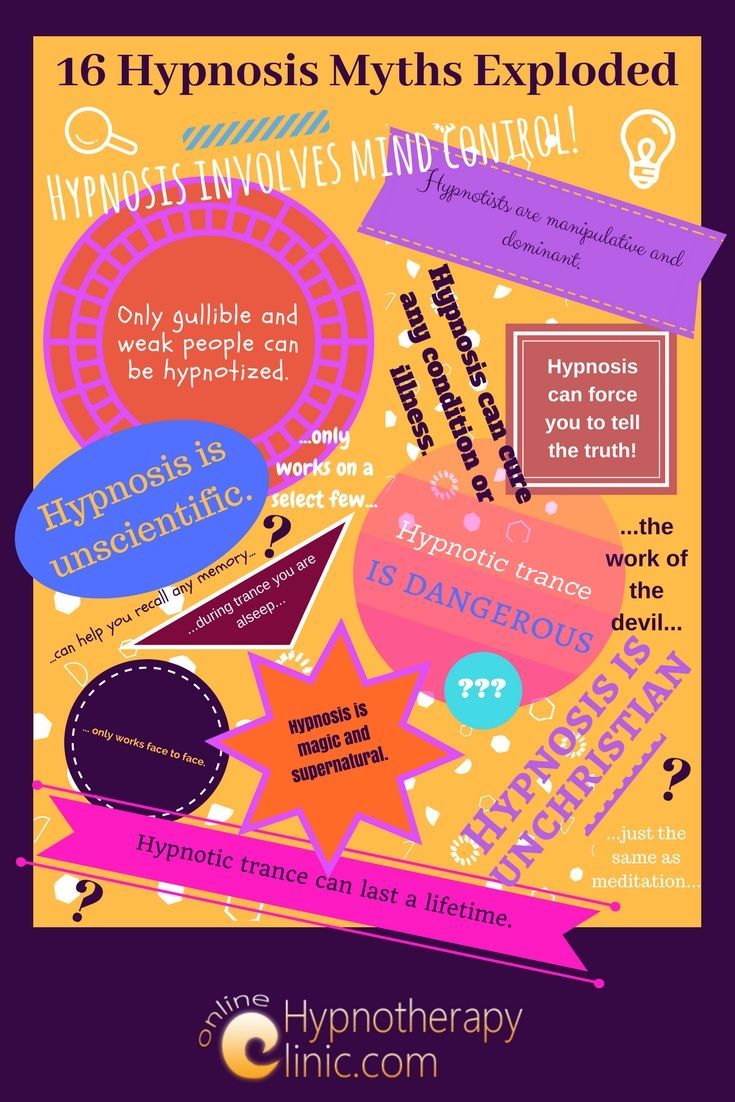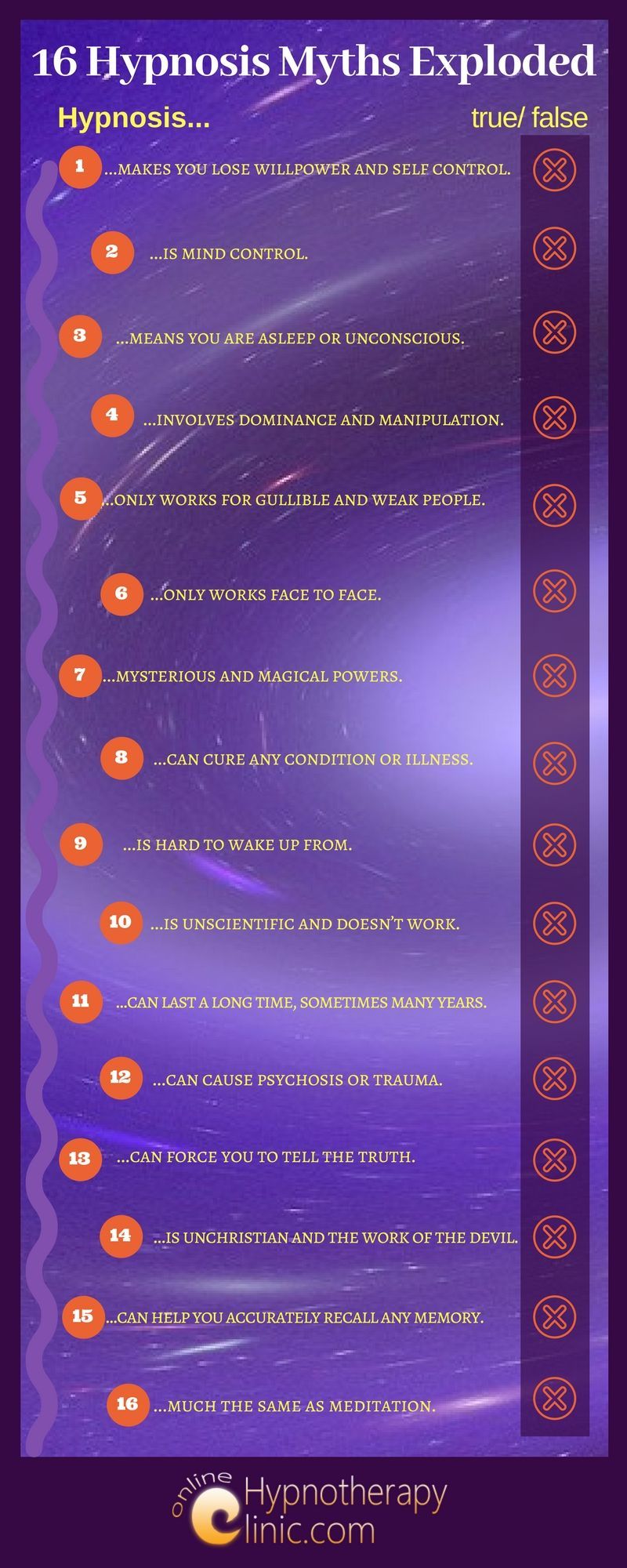16 Hypnosis Myths Exploded
By Susanna Sweeney, MSC, MBACP, CHT
Ever since the inception of hypnosis many hypnosis myths have been in circulation. These myths serve to stop you from understanding what hypnosis really is.
Understanding what it can and cannot do for you is vital when accessing hypnotherapy for help with the changes you want to make in your life so that you can get the best out of your treatment.
Therefore, I have put together this article- aimed at dispelling the myths surrounding hypnosis.
I am sure you will recognize at least some of these faulty beliefs. We tend to pick up on them through the 'ether' of our culture. Even throwaway remarks about hypnosis that we have overheard someone say- no matter how unfounded- can be enough to turn us off, seeing that the therapeutic uses of hypnosis are still so mysterious to most.
The media, too has its fair share of
misrepresentations of hypnotherapy to account for- I have written more
about that in my article on representations of hypnosis for smoking cessation in the media.
'Better stay away from it then...' the censors guarding our subconscious mind will say when we pick up on those negative messages -and we will obey.
This is why I believe education on hypnosis and hypnotherapy is vital.
So, let's get started.
The Fast Route
In a rush? You can explore this page along the fast route laid out below.
Choose any hypnosis myths from the list below and click to find the answer:
- Hypnotic trance makes you lose your willpower and self control.
- Hypnosis is mind control.
- Hypnosis trance means you are asleep or unconscious and you then wake up with no memory but changed.
- Only gullible people or people with no willpower are hypnotizable.
- The hypnotist dominates and manipulates people.
- There are mysterious and magical powers involved with hypnosis.
- Hypnosis only works face to face.
- Hypnotic trance is dangerous because it can last a long time, sometimes many years.
- You can be awoken from hypnotic trance only by the person who induced it.
- Hypnosis can cure any condition or illness.
- Hypnosis is unscientific and doesn’t work.
- Hypnosis can cause dangerous after effects. It can cause psychosis or traumatize someone.
- Hypnosis is the work of the devil and/ or is unchristian.
- Self hypnosis is much the same as meditation.
- Under hypnosis people can accurately recall any memory you want them to recall- from childhood or even from past lives.
- People in a hypnotic trance can be forced to tell the truth.
The Relaxed Route
This is the best route for you if you are considering going for hypnotherapy treatments. Give busting hypnosis myths a bit of time, relaxing and sitting back with your favorite brew. Read through the article item by item. You are sure to discover something you didn't previously know about hypnosis.
Hypnosis Myths #1
"Hypnotic trance makes you lose your willpower and self control."
The
hypnosis myth that hypnosis results in a loss of willpower has been
around for a very long time. This myth featured in many 19th and early
20th century novels and movies and from then on, has been passed down
through the generations.
In reality, during hypnosis, people
voluntarily and temporarily suspend their internal censors, but remain
in full control, and continue to be directed by their own willpower.
Here is a client’s account of what hypnosis felt like:
“I
really liked the relaxation part because I am not a relaxed person at
all- so I went with the flow. My arms and legs felt very heavy, but in a
very nice way, I liked the sensation. My eye lids became heavy. I knew I
could have lifted my arms when you said that I could not- but I decided
to let things be, to just remain relaxed, because I enjoyed letting go.
In my head I became curious then as to how this would pan out,
what would happen next, and because you had told me beforehand to
embrace the suggestions I decided to do just that- and then I felt,
every time I did that, a warm and optimistic feeling all over me which
felt really good, really nice.”
This is client who attended me for weight loss, reports a typical experience that many people have in hypnosis.
Note the following elements:
• Being very relaxed
• Being very comfortable
• Going along with the instructions given
• Enjoying the experience
• Deciding to suspend judgement as they become curious
• Deciding to suspend acting on impulses during the session
• Using their willpower to help the purpose of the session so they can achieve their goal
• Feeling in complete control
So much on the experience of willpower and self control during hypnosis induced trance states.
There are other elements though to someone’s overall experience of their hypnosis treatment.
Reports tend to be quite polarized, some people
swear by hypnosis and others are the opposite. Find out here why that is
so, in The Truth About Quit Smoking Hypnotism. Even though I wrote this
article with stop smoking hypnosis in mind, much of it holds true
across any issues you can attend hypnotherapy for.
An important point to note is that there are always a few bad apples and the same holds true for the hypnosis field. Do thoroughly check out the practitioner you are planning to attend. If you want to stop smoking, here is how you can find the right quit smoking hypnotist for you.
 Bust your internalized hypnosis myths: there is nothing to be afraid of when you go into hypnotic trance.
Bust your internalized hypnosis myths: there is nothing to be afraid of when you go into hypnotic trance.Hypnosis Myths #2
"Hypnosis is mind control."
Does hypnosis have the power to control your mind? I really don’t think so.
I
have no reason to believe that hypnosis used on fully grown can achieve
anything resembling mind control. But, of all hypnosis myths, this must
be one of the most pervasive, and most damaging ones that stops people
from using hypnosis.
“But what about stage hypnosis?” you ask.
You
have probably seen hypnosis shows on TV or even live on stage. The
hypnotist will have made grown men act as if they are pregnant and about
to go into labor, or grown women go around the audience looking for
one of their breasts that has supposedly fallen off.
But, such shows are all about showmanship.
Stage hypnotists use a lot of tricks to get the desired effects:
- They consciously build up excitement and a sense of expectation in the audience before the show ever starts through clever advertising using the right images and story telling.
- They plant trained people in the audience who will volunteer to go up on stage, where, naturally, their performance will look very impressive. The next volunteer and the next will naturally fall in line.
- They cold-read and test volunteers to find the most suggestible subjects to use- the rest are sent back to their seats.
- They also use specially designed stage acts which are very easy and natural for volunteers to perform, while looking impressive to the audience.
Stage hypnosis has nothing to do with mind control.
Subjects are typically in a very light trance, and many play along for
the sake of having fun.
As I said above in the section on
willpower and self control, typically the experience of clients is that
of a voluntary and temporary suspension of judgement and acting upon
their willpower- for the sake of achieving their desired goal.
Hypnosis Myths #3
"Hypnosis trance means you are asleep or unconscious and you then wake up with no memory but changed."
Many people expect to fall asleep or be unconscious during hypnosis. In fact, during hypnosis you may be more alert and more focused than in
ordinary consciousness. You will remember all or most of the session.
Find out in detail how it feels to be in hypnotic trance here: Hypnosis or self hypnosis trance- 8 things you should know.
Hypnosis Myths #4
"Only gullible people or people with no willpower are hypnotizable."
In
western culture, we don’t like to let go and relax. We prefer to be, or
to appear to be, in control 100% of the time. We believe achieving
things through willpower is the best way to achieve them. I would
imagine that this cultural imprint is the origin of the above idea.
In
reality, going into hypnosis is a consensual process. I have tried to
illustrate this above with the account a client gave of how hypnosis
felt for them.
If, on some level, the client did not want to go
into hypnosis, they would of course be able to resist, and that would be
the end of their treatment. Anyone would be able to resist if they
wanted to resist hypnosis.
But, I ask you, what would be the point in that when you are paying a hypnotist to help you resolve an issue or achieve a goal?
Recent
research from Stanford tells us that most people can be hypnotized very
easily- that is if they give themselves permission to be hypnotized.
And those who make up the 4.6 % who find it difficult initially to go
into trance, can learn how to.
If you want to try hypnosis for
your issue you would be well advised to attend it with an open mind and
suspend any ideas that going into hypnosis means you are gullible, or
that you must resist in order to show you have great willpower. I am
making this recommendation simply so that you can get the best result
possible.
Hypnosis Myths #5
"The hypnotist dominates and manipulates people."
Overall,
hypnosis for therapeutic use is meant to be a helpful intervention that
enables your mind to change so that you can shift whatever issue it is
you want to shift. There are differences in approaches, however.
Throughout the history of hypnosis, styles of doing hypnosis have changed and evolved.
The
older or more traditional approaches, which you see reflected in how
stage hypnotists work as well, involve a degree of deception and
showmanship, which can feel somewhat manipulative and dominant.
Nowadays, there are many hypnotherapists who use a permissive and
cooperative approach.
I would encourage you to do a thorough
background check on the practitioner you are planning to attend. Find
out how they work and what style they use so you can feel comfortable
working with them.
If you want to give up cigarettes, find out how to find the right quit smoking hypnotist here.
Hypnosis Myths #6
"There are mysterious and magical powers involved with hypnosis."
This is likely one of the very oldest hypnosis myths, stemming from a time when magic was believed to be real.
Here is the reality:
For the purpose of affecting change in our minds, hypnosis utilizes an inbuilt ability we all have to relax and switch off our internal censors. This is a state that we can all access, whether induced by a hypnotist or through self hypnosis.
Find out why this is so in my
article “Does self hypnosis work?” and find out “How does hypnosis
work?” here.
The skills involved are simple, and easily learned.
Check out self hypnosis techniques, and think about how you might
utilize the power of hypnosis.
In short, there is nothing
mysterious or magical about hypnosis. Having said that, sometimes the
outcomes can feel like magic to clients when- before using hypnotherapy
for change, they have tried and tried to get rid of an issue and nothing
else helped.
Hypnosis Myths #7
"Hypnosis only works face to face."
Although most people
probably choose to attend a hypnotist the first time they access
hypnosis, you don’t necessarily have to attend face to face.
You
can experience hypnotic trance just as well by listening to a recording,
using self hypnosis techniques at home, or working with a hypnotist
over Skype or a similar service.
Some hypnotists work with their clients over the phone.
In
fact, the first formal hypnosis session I ever attended was part of a
webinar with hundreds of participants all online at the same time as the
hypnotist talked us through a session protocol, and I had a very deep
experience in that session that stayed with me for years after.
Having
said that- if clearing your issue requires life regression hypnosis I
would recommend that you attend a hypnotist that you have a good rapport
with, the reason being that a good therapeutic relationship which
provides safe holding is very important for this work.
Hypnosis Myths #8
"Hypnotic trance is dangerous because it can last a long time, sometimes many years."
Again,
we have Svengali and Dr. Caligari at work here, our 19th and early 20th
century manipulative and abusive, mind controlling horror hypnotists,
still impacting public consciousness and maintaining hypnosis myths to this present day.
Both
these fictional characters controlled women over a period of many years
and the women found it hard to awaken from the trance imposed.
Thankfully, this fictional scenario is a world away from the reality of
hypnosis for therapeutic use.
At the end of a hypnosis session,
your hypnotherapist will talk you through a simple, and usually quite
brief protocol that will instruct you to come back to ordinary
awareness.
This protocol usually involves counting, either from,
say, one to three, or counting backwards, say from five to one. At the
end of the count, within a short space of time, you will come back to
ordinary awareness, feeling relaxed and well. Another hypnosis myth
exposed.
Hypnosis Myths #9
"You can be awoken from hypnotic trance only by the person who induced it."
If-
in the midst of a hypnosis session, a hypnotherapist was to walk out
and leave their client in the chair on their own- knowing everything you
now know about hypnosis, what do you think would happen?
The
answer is plain and simple. They would come back to ordinary
consciousness after a while. They’d probably become quite annoyed at the
hypnotists carry on. (And rightly so.)
If, instead of the first
hypnotist, a different one came into the room and continued with the
session, what do you think would happen?
Well- in the same way,
the person may become quite annoyed! They may decide to keep going with
the session, or they may decide they have enough of it all, return to
ordinary consciousness and walk out. (I wouldn’t blame them if they
walked out.)
Coming out of hypnotic trance is easy- as easy as it
is to go into trance in the first place. Remember, hypnosis trance is
based on consensus. You have to agree to be in hypnosis. The moment you
start disagreeing the magic is gone, and the pumpkin coach back to
ordinary consciousness will arrive.
Hypnosis Myths #10
"Hypnosis can cure any condition or illness."
Hypnosis can
help you in many ways. For example, hypnosis can help you to heal emotionally, it can help you overcome
addictions, alleviate pain, or achieve your goals. There are indeed many
issues that can be helped with hypnosis- any issue in which the mind
plays a large role. With hypnosis you can learn to harness your
subconscious mind and then let your mind lead the way.
However,
while hypnosis is a powerful form of therapy, it would be making an
exaggerated claim to say that hypnosis can heal any issue. No therapy
can do that.
Health issues in particular are better off in the
hands of qualified practitioners, although you may use hypnosis to deal
with certain aspects of an illness.
For example, hypnosis has a
strong history in its use to alleviate pain. To support illness,
hypnosis can also be used for relaxation which is known to generally
benefit healing and the immune system. Guided imagery too can be a
powerful stimulant for the immune system, for example by strengthening a
patient’s will to heal.
Hypnosis Myths #11
"Hypnosis is unscientific and doesn’t work."
This idea simply is not true.
Although
hypnosis is vastly under researched, there is some good scientific
evidence available that supports the use of hypnosis for some issues,
such as stop smoking hypnosis, childbirth hypnosis, or hypnosis for
pain.
Research is also starting to be carried out into what
actually happens in the brain during hypnosis, essentially showing that
hypnosis is real. Spiegel (2016) carried out brain scans on subjects in a
hypnotic state and, in a large sample of subjects revealed a clear and
consistent pattern as to which parts of the brain were more active than
others during hypnosis.
Personally I would wish for much, much more
research on the topic of hypnosis. I believe that so far, we have only
scratched the surface as to what hypnosis can do for us as a human race.
Having said all that, also, the claim of being ‘unscientific’
affects many alternative health therapies. Some of them, for example
acupuncture- have been in use since ancient times.
So, hypnosis is not alone here.
The
beneficial effects of many of these therapies are difficult to measure
using conventional methods. Researching them further and getting to the
bottom of why they work will bring us to the frontiers of science.
Research is also the way to get rid of these hypnosis myths once and for all.
Hypnosis Myths #12
"Hypnosis can cause dangerous after effects. It can cause psychosis or traumatize someone."
As
a psychotherapist who has been working with many trauma clients over
the years I am really impressed with the safety, precision and
profundity of how hypnosis can help people.
Hypnosis acts in both
gentle and powerful ways. People usually feel very grounded and more
connected than usual after hypnosis sessions.
Again I believe
that this myth of hypnosis causing psychosis or trauma has come about
through how hypnosis has been represented in many novels over the last
two hundred years and in many movies over the last one hundred. And when
people are repetitively told that something is dangerous and to be
feared, they will end up being afraid of it. (Repetition itself is a
frequently used hypnosis technique.)
Having said all that, if
your issues require life regression hypnosis, i.e. you want to change
issues around anxiety, depression, fears or phobias, or another deep
seated issue that relates to childhood trauma, do make sure the
practitioner you are planning to work with is reputable and experienced
with these issues.
If done right, life regression hypnosis is both powerful and safe and can bring about profound change.
Hypnosis Myths #13
"Hypnosis is the work of the devil and/ or is unchristian."
Throughout
human history, when there were new scientific insights or inventions
that people found hard to comprehend. The idea of those ideas being ‘the
devil’s work’ was often invoked by those eager to preserve the status
quo.
Hypnosis is no more the devil’s work than Gallileo’s discovery that earth is round.
Seeing
that hypnosis helps people heal, and that hypnosis and self hypnosis
trance make people feel good, I find it hard to see how anyone could
believe hypnosis to be the devil’s work. You really would have to have
very deeply entrenched beliefs and know nothing about the topic to
accept such a stance, but some people unfortunately do.
If you
are a Christian and you are looking for hypnosis treatment and are
afraid because you have heard such arguments, you should know that there
are many Christian hypnotherapists out there and you are bound to find
someone in your local area.
Historically, hypnosis has often
been categorized as either the devil’s work, or, in the other extreme,
as God’s work. I would argue that it is neither. Hypnosis used
therapeutically is simply a powerful tool for healing and for self help.
Hypnosis Myths #14
"Self hypnosis is much the same as meditation."
Meditation only requires you to close your eyes, while hypnosis requires you to relax very deeply.
Meditation
is a way of calming the mind. Self hypnosis is a way of focusing the
mind on a particular issue you want to work on or change.
Meditation is designed to give you clarity of mind, self hypnosis involves mind hacks to change your perspective.
You can see that these are two different things, with distinctly different functions and processes involved.
Find out here how to use self help hypnosis to change your life.
Hypnosis Myths #15
"Under hypnosis people can accurately recall any memory you want them to recall- from childhood or even from past lives."
I
use hypnosis therapeutically only. I don’t believe it is an accurate
tool for memory retrieval, and neither do I believe that memory
retrieval just for the sake of it is a good idea.
I have been working
with people therapeutically for many years and if there is one thing I
have learned about the human mind it’s to trust the protective power
within the subconscious mind.
Your subconscious mind will bring
forward whatever memories you need in order to heal or change the
particular issue you are working on. If no other memories will come,
there is a reason for that.
Either, you have all the memories you
need, other memories are not relevant or not relevant at this time, or
you are not ready for more memories coming forward because you might
become overwhelmed. Trust your subconscious mind, it will guide, help
and protect you.
Memories will come as you need them. This is as true for memories from early childhood as it is for past life experiences.
Hypnosis Myths #16
"People in a hypnotic trance can be forced to tell the truth."
Truth checks are a distinct income stream for some hypnotists.
One particular situation that is popular for truth checks is if one spouse suspects the other of having an affair.
The hypnotist will bring both of them into the treatment room. The spouse under suspicion will be brought into hypnosis, and told to place their hands on their knees. Each finger will be allocated a different answer option such as true, untrue and some more grey areas in between.
The spouse under suspicion, with the partner watching is then being asked a series of questions, reaching from harmless and inconsequential to questions about the incident in question.
The spouse under suspicion is told they must answer verbally while also lifting the appropriate finger. The idea is that the subconscious mind will answer through finger movements while the conscious mind will answer verbally. If there are discrepancies between what the person says and what their fingers say, their answer is deemed a lie.
Do you believe this is a reliable tool to establish if someone is telling the truth or not?
I don’t.
Firstly, don’t forget, people do retain their willpower and self control under hypnosis. Therefore, answers that look like the person is telling the truth could easily be manipulated. And secondly, answers that look like a lie could be based on an honest mistake. When you are slightly confused in a hypnotic state and each of your five fingers has a different job to do, it would be easy to get things wrong.
To me, truth checks are a piece of showmanship and far from a reliable tool.
To conclude I will maintain the idea that you will inevitably tell the truth when under hypnosis is just another one of our hypnosis myths.
What is Hypnosis? Other Articles on This Topic
Understand the Basics
Discover the Power of Hypnosis
Discover the power of hypnosis through 10 amazing facts about hypnosis you most likely have not heard before.
Six Wonderful Benefits of Hypnosis for Creating the Life you Love
Find out the benefits of hypnosis over coaching and traditional talk psychotherapy in helping you change your life for the better and achieving your goals.
You may have heard anecdotal reports about hypnosis being nothing more than unscientific ‘mumbo-jumbo’ which might have planted this question in your mind. So, does hypnotherapy work? Find out my answer to this charged question, and it probably isn't what you would expect.
The 3 Worst Mistakes Hypnotists Make
Find out the three worst mistakes any hypnotist can make so that you can avoid them and find the right hypnotist for you.
Evolution has given humans a powerful tool that enables us to be the most dominant species on the planet- yet this tool contains a critical flaw that is limiting many people and preventing them from living their dream. This may be limiting you, too...
The Secret Language of Hypnotherapy
Learn the secret language of hypnotherapy geared towards the requirements of your subconscious mind so that you can reach your goals more easily.
Find out the most common issues that hypnosis can help you with and see what you could do with hypnosis to change your life.
This article is a great starting point to understanding what to expect from hypnotherapy treatment, including what you can do to get the most from your treatment.
Hypnosis has been shrouded in mystery. There are many myths or, simply, false beliefs attached to hypnosis. You, too, have likely picked up a few of them as they are ‘around’ in public consciousness. Let me bust those myths for you so you can be free to enjoy and appreciate hypnosis for what it is.
Hypnosis or Self Hypnosis Trance
Hypnotic trance is referred to with much mystery. Is it really that spooky? Allow me to talk you through what the experience is like.
Hypnosis Methods and Ways of Working
This article covers everything you want to know about suggestion hypnosis, including what it is, what it can do for you, how it works, what techniques are used and how you can get the very best out of it. Suggestion hypnosis can help you to reach your goals and change your life.
Regression Hypnosis can help you to clear blocks relating to the past which are causing you trouble now. Find out how it works, how it compares to coaching and psychotherapy and see if it is suitable for you.
This article fills you in on how you can get the very best from regression hypnosis and is a must read if you are thinking of embarking on hypnotherapy treatment for a complex personal issue.
Some hypnotists offer specific sessions to uncover past life memories. Is this a good idea? Find out what my thinking is on how to get the best results from past life hypnosis.
Does online hypnotherapy work or is it inferior to face to face work as some people say? Find out what's involved and form your own opinion about advantages and disadvantages working online with us.
What is Havening and how Can it Help you Change Your Life?
Find out about a novel psychosensory treatment we combine with hypnosis which can help you clear trauma, fears, phobias, anxiety, low self esteem and more while also supporting you in building resilience and positive emotions.
Discover how well hypnosis could work for changing your particular bad habit and how you can make it into a starting point for changing your life.
Hypnosis for Permanent Rapid Change
No more scripts. The new way to work with live issues. It's dynamic, fast, gentle and powerful.
Self Help Hypnosis Articles
Can you help yourself with hypnosis? Find out here...
You will find this question answered but in a way you probably would not expect. Find out how self hypnosis is always at work, whether you harness it as a skill or not...
The Benefits of Self Hypnosis
Find out in this article how you can benefit from self hypnosis in your life, including what issues you can use it for.
Self-Hypnosis Relaxation Techniques
A good place to start practicing self hypnosis techniques first before infusing them with images regarding your specific goals, or changes that you want to make in your life is with relaxation techniques. Find a sample relaxation script on this page that you can start using today.
Self Hypnosis for Goal Setting
Goal setting is key in working with personal goals. If you don’t get your goals just right, you are much less likely to get good results. Find out how to overcome the seven most common mistakes with goal setting when you use a self hypnosis based approach.
Self-Help Hypnosis- 7 Challenges and How to Overcome Them
Like any other form of therapy, self-help hypnosis, too has some limitations which you should be aware of before you start practicing. I also offer some practical tips and solutions to help you overcome most of these limitations.
Auto Suggestions
In this article, find out the history of auto suggestions, the science behind them and how you can use them to your advantage to change your life.
In this article, find detailed instructions on how to design, administer and troubleshoot your auto suggestions successfully so that you can use them to change your life.
I hope you have found this page on dispelling hypnosis myths useful, and I do hope I have helped you to change your perspective on a most useful tool for making life changes.
Are there any hypnosis myths that you are aware of that I have not listed and explained on this page? If so, you can let me know below.
Regards,

Recent Articles
-
Havening Technique Training auf Deutsch
Apr 18, 25 02:59 AM
Havening Technique Training auf Deutsch- Details und Buchung -
Client Testimonials
Oct 06, 23 06:08 AM
Client Testimonials of my Online REPAIRenting® Program that uses various psychosensory approaches for safe and quick transformation -
Smoke Free Thanks to This Amazing Resource
Aug 02, 23 09:26 AM
Oh thank you for this simple resolution to all my worries! I feel like I have had a weight lifted off my shoulders. It is like cheating on giving up smoking.






New! Comments
What do you think? Leave a comment in the box below.